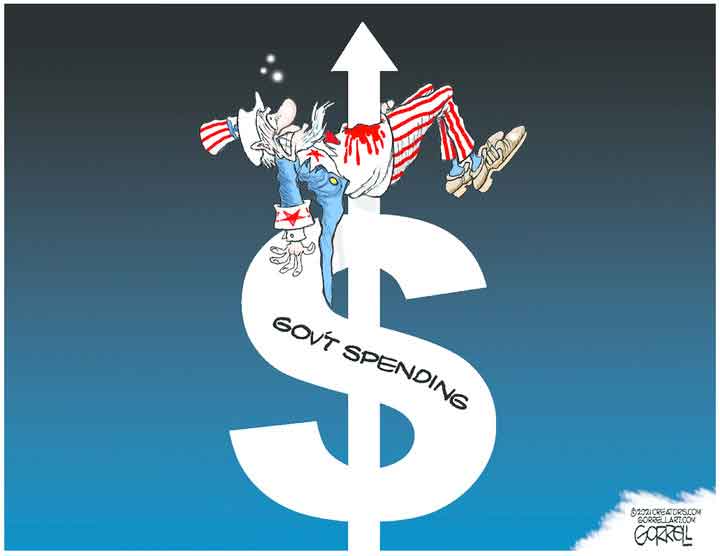
Little else would have been talked about in conservative media, and ambitious Republican politicians would have competed with one another to demonstrate the most intense, comprehensive resistance, up to and perhaps including chaining themselves to the U.S. Treasury building in protest.
In 2009, President Barack Obama created a spontaneous, hugely influential conservative grassroots movement on the basis of an $800 billion stimulus bill and a health care plan estimated to cost less than a trillion. In 2021, Biden is proposing to spend about $6 trillion in his first three big bills, and he can barely create more interest than the debate on wearing masks outdoors.
The conventional wisdom was that after the free-spending Trump years, Republicans would snap back to being deficit hawks when out of power. There's been some of that, but the relatively muted reaction to Biden's almost incomprehensible spending ambitions is testament to the fact that, no, Republicans simply aren't as interested in fiscal issues anymore.
The party has changed and would much rather talk about the border than the budget, and cancellations than Congressional Budget Office scores. Of course, no Republicans will vote for Biden's proposals and all will strenuously object, but that his plans won't engender the fierce reaction they would have 10 years ago is yet another way in which the Overton window has shifted on deficit spending.
What happened to the GOP? The short answer is Donald Trump.
Beginning in the 2016 primaries, he demonstrated in vivid fashion that as the GOP coalition had become older and more working class, it didn't care as much about spending restraint or entitlement reform as the party's leaders had presumed.
Once in office, Trump taught Republicans how to relax and love expansionary fiscal policy. By 2019, he was running a nearly $1 trillion deficit at a time of peace and prosperity, and of course, the pandemic blew the lid off in 2020.
The historic spending bills last year, passed with bipartisan majorities, underlined the GOP's newly lax attitude toward spending (although Republicans still, overall, wanted to spend less than Democrats).
It's difficult for the party to come back after being on board all that, and then immediately turn around and sound the klaxons again about the dangers of red ink.
Besides, the klaxons have issued false alarms before. Republicans realized that past dire warnings of imminent economic harm from deficit spending — rising interest rates, spiking inflation, an overall debt crisis — haven't panned out.
Indeed, the failure of the parade of horribles to come about after the Obama years is one reason the center-left now believes all such admonitions should be ignored, and there's almost no upper bound on deficit spending.
Meanwhile, Republican politics has become focused on culture war issues, another change symbolized by Trump. There was some tutting among fiscal hawks at the time Biden's $1.9 trillion Covid relief bill passed that conservatives seemed more upset about Dr. Seuss Enterprises ceasing the publication of several of the legendary children author's books than about an off-the-charts spending measure that, it turns out, was just the appetizer.
But the culture-war issues hit close to the bone in a way that fiscal issues don't. Conservatives worry about their free-speech rights getting trampled, about schools distorting the minds of their children, and about the country's history getting redefined — and it's hard to get them to care more about a balance sheet that may have deleterious consequences at some future date than these other, more definitional questions.
None of this means that Biden has a free hand on spending. He will presumably be less successful in getting all that he wants with his latest two roughly $2 trillion spending bills. Even in a permissive environment, some natural political exhaustion with the high levels of spending will kick in, and it's always more complicated when tax increases are proposed to pay for at least part of the bill.
Republicans aren't going back to their debt-obsession circa 2010, when opposition to deficits was a key organizing principle of the GOP, but they should aspire to be, if not the party of green eye shades, the party of fiscal sanity.
Deficit spending hasn't led to dire outcomes to this point, although that doesn't mean it never will. If interest rates do ever-markedly increase again, the level of debt will strain the economy and force unpalatable choices on policymakers of steep tax increases or spending cuts or both. The status of the U.S. dollar as the world's reserve currency could be threatened.
Why increase these risks if it's not strictly necessary?
That question won't bring people into the streets, yet it's one that President Biden and his supporters can't persuasively answer.
(COMMENT, BELOW)


 Contact The Editor
Contact The Editor
 Articles By This Author
Articles By This Author